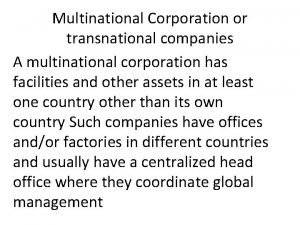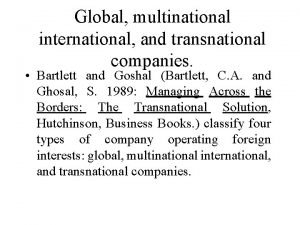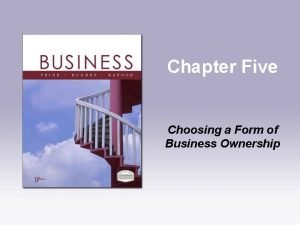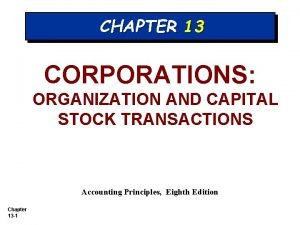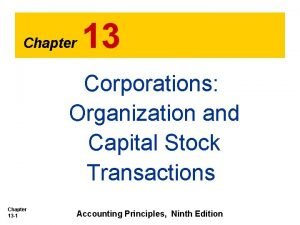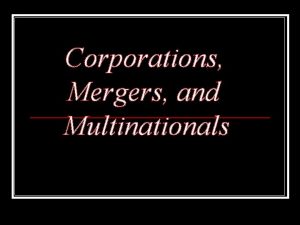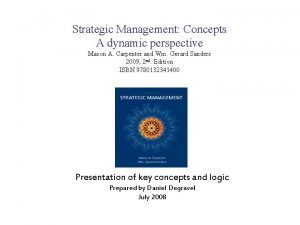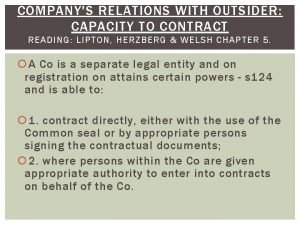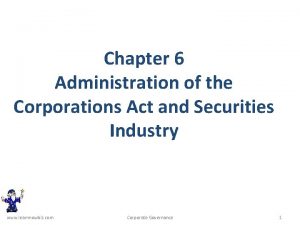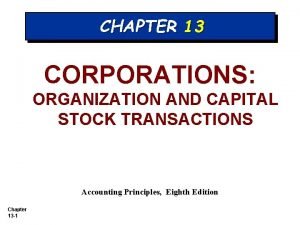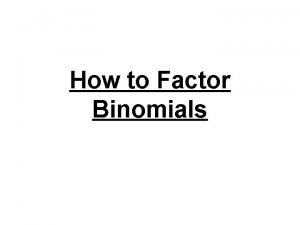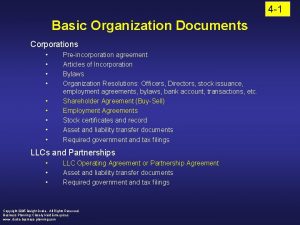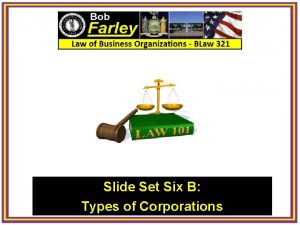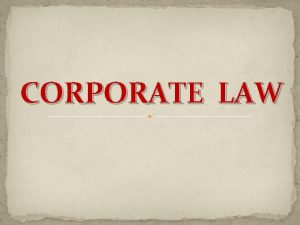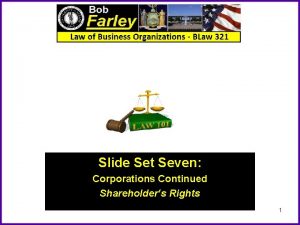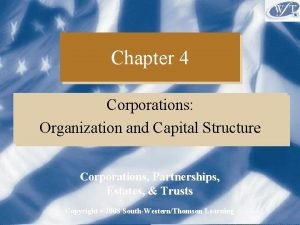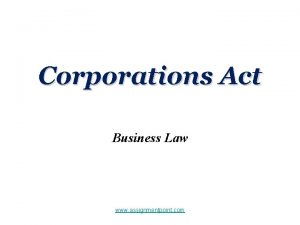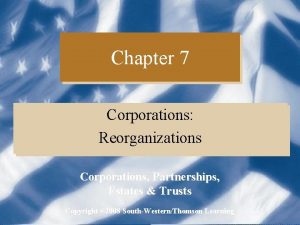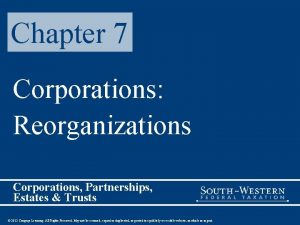Slide Set Six Introduction to Corporations Preincorporation Formation























- Slides: 23

Slide Set Six: Introduction to Corporations Pre-incorporation, Formation and Powers 1

Last Time We Spoke About: • Sole Proprietorships • Partnerships - 1 NATURE OF PARTNERSHIPS - 2. FORMATION OF PARTNERSHIPS - 3. PROPERTY OF A PARTNERSHIP - 4. DISSOLUTION OR TERMINATION OF PARTNERSHIPS - 5. RELATIONS BETWEEN PARTNERS - 6. LIMITED PARTNERSHIPS 2

Tonight We Will Speak About: • Corporations - 1. Types of corporations - 2. Pre-incorporation - 3. Formation Corporations - 4. Property of Corporations - 5. Powers of Corporations 3

TYPES OF CORPORATIONS: • Private Corporations • Business Corporations • Foreign / Domestic • Close / Publically Traded • Professional Corporations • Subchapter S Corporations • Public Corporations • Public Benefit Corporations • Public Authorities • Municipalities • Not- for – Profit Corporations 4

Corporation Defined: • Black’s Law Dictionary defines a Corporation as: “An artificial person or legal entity created by or under the authority of the laws of the state or nation, which has an existence distinct from that of its associated individuals, and has a duration that is either perpetual or for a limited term of years, and which acts as a unit in matters relating to the common purpose of the association and within the scope of the powers conferred upon it by law. ” 5

I. INTRODUCTION A. MEANING OF ''CORPORATION'' A corporation is a legal entity (an artificial person) created in accordance with statutes. The corporate entity is separate and distinct from the legal personalities of those who own and manage the corporation. In New York, as elsewhere, corporate law is mostly statutory, and most of the statutory law relating to general business corporations (i. e. , corporations for profit) is contained in the New York Business Corporation Law ("BCL"). 1. Principal Characteristics In general, corporations have the following principal characteristics: a. Limited Liability Because a corporation is a separate legal entity, its debts and obligations are treated as being distinctly its own; its shareholders and managers are ordinarily not liable for corporate indebtedness. One exception is the liability of the 10 largest shareholders of non-publicly traded corporations for the wages of corporate employees. [BCL § 630] b. Entity Powers As a separate entity, a corporation can contract in its own name, sue or be sued, own or convey property, and be held criminally liable for crimes that it commits. (BCL § 202] c. Centralized Management Control of a corporation is centralized in a board of directors elected by shareholders. In general, the shareholders have only extremely limited power to make management decisions (except insofar as they may elect and remove directors). 6

I. INTRODUCTION CONTINUED A. MEANING OF ''CORPORATION'' CONTINUED 1. Principal Characteristics Continued d. Continuity of Existence Unless duration is specifically limited in the certificate of incorporation, a corporation's duration is "perpetual"; i. e. , it continues until dissolved, merged. or consolidated in accordance with the BCL. The death, withdrawal, bankruptcy, or incapacity of any of its shareholders or managers has no effect on the corporation's existence. [BCL § 202(a)(l)] e. Free Transferability of Interests The interest of the corporation's owners is divided into shares, and these shares may be freely transferred; that is, another person may be fully substituted in the place of the transferor as the holder of ownership interests (shares) in the corporation. f. Statutory Sources of Authority A corporation is a creature of statute; it and its managers and agents have only such authority to act as is conferred by or pursuant to statutes (principally the BCL), the case law (to a lesser extent), or legally permitted provisions of the certificate of incorporation or bylaws. 2. Constitutional Status A corporation is a "person" entitled to due process and equal protection of the law under the Fifth and Fourteenth Amendments, but it is not a "citizen" referred to by the Privileges and Immunities Clause of Article IV or the Fourteenth Amendment. 7

I. INTRODUCTION CONTINUED B. DISTINGUISHED FROM OTHER BUSINESS ORGANIZATIONAL FORMS A corporation having the characteristics discussed above may be validly formed only by compliance with certain statutorily prescribed formalities. If there is a failure to comply, an inadvertent partnership among the owners will be the probable result. Alternatively, the owners may deliberately form a partnership or another of the possible forms of business organizations discussed below. 1. Comparison with Partnership A partnership is not a separate entity distinct from its owners, the partners. Each partner is jointly and severally liable for the debts of the partnership. (NY Partnership Law § 26). Each partner has a voice in management unless the partners all agree to the contrary. The existence of the partnership and the ownership interests are not freely transferable. (NY Partnership Law § 12). 2. Comparison with Limited Partnership A limited partnership is similar to a general partnership, except that a limited partnership includes one or more “limited partners. " The liability of limited partners to partnership creditors does not exceed the limited partners' respective investments in the business. Strict compliance with the Revised Uniform Limited Partnership Act (NY Partnership Law § 121) is required. 3. Comparison with Joint Stock Association A joint stock association is legally conferred with certain corporate characteristics. (Continuity of existence - perpetual existence, centralized management, and freely transferable ownership interest - shares). However, the owners (shareholders) of these associations do not have the benefit of limited liability. These Associations are formed and regulated by the NY General Associations Law. 4. Comparison with Business Trust The business trust (so-called Massachusetts Business Trust) is recognized as a business form in New York. The holders of shares of beneficial interest in the trust (the owners) do have the advantage of limited liability provided they have no power to control the trustees in the management of the trust. A board of trustees should be a self-perpetuating body. (See Brown v. Bedell, 263 N. Y. 177 (1934)). 8

II. PROMOTERS AND PREINCORPORATION TRANSACTIONS A. PROMOTERS AS FIDUCIARIES As used by the courts, the term "promoters" refers to persons who provide the organizational initiative for the founding of a business and for the formation of a corporation (or other form) to carry on the business. The term is often used to refer to the “insiders" (as opposed to the "outsiders") whose efforts and resources are contributed in the early stages of a new business enterprise. In this latter sense, the term implies the existence of certain fiduciary duties aimed at protecting (indirectly) the "outsiders" who invest. Promoters may be, but need not be, the "incorporators. " 1. Duty as Between the Promoters As long as there are no "outside" investors, the promoters are the only ones having any legal interest in the transactions of the corporation, thus, self-dealing at this stage is not improper. [See Northridge Cooperative Section No. I. , Inc. v. 32 nd Avenue Construction Corp. , 286 A. D. 422 (1955), aff'd, 2 N. Y. 2 d 514 (1957)]. Nonetheless, as between themselves, promoters do have a fiduciary duty to each other until the corporation is organized. [See Macklem v. Marine Park Homes, Inc. , 8 A. D. 2 d 824 (1959), aff'd, 8 N. Y. 2 d 1076 (1960)]. After incorporation, promoters cease to have such "partnership" fiduciary duties, and among themselves they have only the rights, duties, and obligations of shareholders (and of managers if such be the case). [See Weisman v. Awnair Corp. of America. 3 N. Y. 2 d 444 9 (1957)].

II. PROMOTERS AND PREINCORPORATION TRANSACTIONS CONTINUED A. PROMOTERS AS FIDUCIARIES CONTINUED 2. Duty as to ''Outside'' Investors a. Profits Taken After ''Outsiders'' Come In Once "outside" investors come into the picture, promoters are charged with fiduciary obligations of disclosure and accountability to the corporation for their secret profits and profits from self-dealingunless there is at least consent or ratification. [See Northridge, supra, app. from remand, 10 A. D. 2 d 244. aff'd, 9 N. Y. 2 d 818 (1961)]. b. Profits Taken Before "Outsiders" Come In Promoters must also account to the corporation for profits from self-dealing before "outsiders" came in if the issuance of the additional shares to uninformed outsiders was contemplated or the public was invited to become original subscribers. Exception: The promoters are not accountable for profits of which the outsiders had notice. [Northridge, supra] c. When Promoters' Fiduciary Duties Terminate The fiduciary duty of promoters to the corporation is not "enlarged" by introduction of new shareholders severa] years after the complained-of transactions. [See Continental Securities Co. v. Belmont, 168 A. D. 483 (1915), aff'd, 222 N. Y. 673 (1918)]. However, promoters do have a fiduciary duty to the corporation both: I) As to investors who subscribed while the promoters were in control; and 2) As to transactions that were fixed in their terms while the promoters were in control, even if the subscribers purchase and the transactions are consummated after the promoters dispose of their interests. 10 [See Shore Terrace Cooperative, Inc. v. Roche, 25 A. D. 2 d 666 (1966)].

II. PROMOTERS AND PREINCORPORATION TRANSACTIONS CONTINUED B. PREINCORPORATION CONTRACTS WITH THIRD PARTIES 1. Liability of Corporation a. General Rule: "Adoption" A contract signed by a promoter before the corporate existence begins cannot, in its inception, be the corporation's contract or binding upon the corporation because an "agent" cannot bind a nonexistent principal [Oakes v. Cattaraugus Water Co. , 143 N. Y. 430 (1894)]. However, the corporation may become liable on the promoter's contract by "adopting" it. • Express Adoption: Adoption" may be express, i. e. by a positive, authorized act. [See Reif v. Williams Sportswear, Inc. , 9 N. Y. 2 d 387 (1961)]. • Adoption by Implication: "Adoption" may also be implied from an acceptance of the benefits with full knowledge (through the corporation's officers) of the contract's existence. [See Morgan v. Bon Co. , 222 N. Y. 22 (1917)]. • "Alter Ego” of Predecessor: A corporation will be liable on preincorporation contracts when it takes over completely the assets of an unincorporated predecessor and becomes the "alter ego" of its promoters. [See Reif, supra]. 11

II. PROMOTERS AND PREINCORPORATION TRANSACTIONS CONTINUED B. PREINCORPORATION CONTRACTS WITH THIRD PARTIES CONTINUED 2. Liability of Promoter New York courts have recognized the general rule that holds the promoter personally liable for contracts entered into "on behalf" of a proposed (but still nonexistent) corporation. [See Puro Filter Corp. v. Trembley, 266 A. D. 750 (1943)]. However, courts have held the promoter not subject to personal liability where either: a. Intention of the Parties: The intention of parties was evidently to bind only the corporation or; b. Novation: There is a novation of the contract where third party agreed to look only to the corporation for responsibility. 3. Enforcement by Corporation A preincorporation agreement intended for the benefit of the proposed corporation is enforceable by the corporation if the corporation expressly or impliedly adopts the contract. Acts in furtherance of contracts are sufficient for this purpose. [See S&B Rubber & Chemical Corp. v. Stein, 7 N. Y. S. 2 d 553, aff'd, 255 A. D. 1012 (1938)] 12

III. FORMATION A. IN GENERAL A corporation is formed by compliance with the formalities prescribed in the New York State Business Corporation Law (BCL). The creation of corporations by special act of the legislature is prohibited except for municipal purposes or for cases where, in the judgment of the legislature, the corporation's objectives cannot be attained under the general laws. [See N. Y. Const. , art. 10, § 1]. B. INCORPORATORS: 1. Who Are Incorporators? One or more natural persons of the age of 18 or over, who act as the incorporators of a corporation. [BCL § 401]. 2. Role of Incorporators The role of the incorporators is to sign (with an acknowledgment) the certificate of incorporation for delivery to the New York Department of State. The department of state files the certificate. When the corporate existence has begun (when filing has occurred), the incorporators hold an organization meeting for the adoption of bylaws and the election of the first board of directors. [BCL §§ 402, 404] C. CONTENTS OF CERTIFICATE OF INCORPORATION: Contents of the Certificate: The certificate of incorporation must set forth the following: 1. Name of the Corporation, 2. Purposes of the Corporation, 3. Office of the Corporation, 4. Authorized Shares and Descriptions, 5. Duration of the Corporation, 6. Registered Agent, 7. Designation of Secretary of State, 8. Limitations on Director’s Liability and 9. Other Provisions. 13

III. FORMATION C. CONTENTS OF CERTIFICATE OF INCORPORATION: 1. Name of the Corporation: The name of the Corporation must include the word "corporation”, “incorporated”, or “limited“ or an abbreviation thereof. [BCL § 301(a)] Use of the word “company” is not sufficient. The name cannot be the same or confusingly similar to the name use or reserved by any other domestic or foreign corporation [BCL § 301(a)(2)]. Neither may the name contain any word or phrase prohibited by statute, or that Implies that the corporation has powers or purposes that it does not have (e. g. "bank”, "doctor”, "finance“, "insurance“, "lawyer“, "loan“ – but of course the appropriate professional corporation can use the word "doctor" or "lawyer"). • Note; Use of any name with intent to deceive is a misdemeanor and may be enjoined. [NY General Business Law § 133] a. Reservation of Name: A name may be reserved for 60 days by application to the New York Department of State. On good cause shown by affidavit, two separate 60 -day extensions may be granted [BCL § 303(d)]. b. Foreign Corporations: In general, foreign corporations doing business in New York, are subject to the same rules as to names as are domestic corporations. As a result, a foreign corporation whose corporate name is not acceptable pursuant to sections 301 and 302, therefore may submit in its application for authority a fictitious name under which it will do business in New York [BCL § 1301(d)]. 14

III. FORMATION C. CONTENTS OF CERTIFICATE OF INCORPORATION CONTINUED: 2. Purposes of the Corporation: A corporation my be formed under the Business Corporation Law for “any lawful purpose”. Lawful purpose does not include any illegal activity or a purpose reserved to corporations formed under another state statute (e. g. railroad corporations, banking corporations, not for profit corporations, religious corporations, public benefit corporations, or insurance corporations. [BCL § 201(a)] a. Catch All Purpose Clause Permitted: The use of a single catch-all purpose clause is permitted (e. g. “to engage in any lawful act or activity for which corporations may be organized”). [BCL § 402 (a) (2)] b. Enumerated Powers Not Required: The powers of the corporation need not be enumerated in the certificate of incorporation. [BCL § 402 (c)] Except as restricted in the certificate, or by law, a corporation in furtherance of its purposes has all the powers specified in the Business Corporation Law section 202. Such powers include, to: (1) Have perpetual duration; (2) Sue and be sued; (3) Have a corporate seal, and to alter such seal at pleasure; (4) Acquire, own, hold, improve, employ, use and otherwise deal in and with, real or personal property; (5) Sell, convey, lease, exchange, transfer or otherwise dispose of, all or any of its property; (6) Acquire, own, hold, vote, employ, sell, lend, lease, exchange, transfer, or otherwise dispose of, bonds and other obligations, shares, or other securities or interests issued by others; (7) Make contracts, give guarantees and incur liabilities, borrow money, issue its notes, bonds and other obligations, and secure any of its obligations by mortgage or pledge of all or any of its property; (8) Lend money, invest its funds, and take and hold property as security for the payment of funds loaned or invested; (9) Do business, carry on operations, have offices and exercise powers in any jurisdiction within or without the US; (10) Elect or appoint officers, employees and other agents of the corporation, define their duties, fix their compensation and the compensation of directors, and to indemnify corporate personnel; (11) Adopt, amend or repeal by-laws; (12) Make donations, irrespective of corporate benefit, for the public welfare or for community or similar purposes; (13) Pay pensions, establish and carry out pension and benefit plans, trusts and provisions; (14) Acquire, own, hold, sell, lend, exchange, transfer, pledge, use or otherwise dispose of its own shares; (15) Be a promoter, partner, member, associate or manager of other business enterprises, or to the extent permitted in any other jurisdiction to be an incorporator of other corporations of any type or kind; and (16) Have and exercise all powers necessary or convenient to effect any or all of the purposes for which the corporation is formed. 15

III. FORMATION C. CONTENTS OF CERTIFICATE OF INCORPORATION CONTINUED: 3. Office of the Corporation: The county in New York of the “office of incorporation” must be stated. [BCL § 402 (a) (3)] “Office of Incorporation” means the office referred to in the certificate of incorporation and need not be an actual place of business. [BCL § 102 (a) (10)] 4. Authorized Shares and Description: The certificate of incorporation must set forth: a. Shares Authorized: The aggregate number of shares authorized to be issued and a statement of the par value of such shares or a statement that such shares shall have no par value. [BCL § 402 (a) (4)] b. Any Classes of Stock: If shares are to be divided into classes, the number in each class, statement of par value or no par value, statement of designations, and relative rights, preferences, and limitations of shares of each class. [ BCL § 402 (a)] c. Any Preferred Shares: If preferred shares are to be issued in series, a statement of variations in the series, a statement of the board's authority, if any. to establish and designate series and fix variations between them. and a statement of any limitation on the board's authority to change the number of shares of any series of preferred shares. (BCL § 402(a)(6)] d. Any Pre-emptive Rights: Any provision limiting or denying pre-emptive rights for corporations in existence prior to February 22, 1998. [BCL § 622] 5. Duration of the Corporation: If the duration is not to be “perpetual”, the period of life of the corporation must be stated in the certificate of incorporation. [BCL § 402(a)(9)] 16

III. FORMATION C. CONTENTS OF CERTIFICATE OF INCORPORATION CONTINUED: 6. Registered Agent: The corporation's registered agent for service of process, if any, must be designated in the certificate of incorporation. [BCL § 402(a)(8)] A registered agent is optional and is in addition to the designation of the Secretary of State. The registered. agent must be a resident of New York State, or have a business address in New York State, or have a foreign or domestic corporation registered in New York State. [BCL § 305(a) ] 7. Designation of Secretary of State: The New York Secretary of State must be designated as agent for service of process (and post office address given forwarding process). [BCL § 402(a)(7)] * Note: Even without express designation, the Secretary of State is the agent for service of process for all domestic corporations and also foreign corporations subject to New York jurisdiction. (BCL §§ 304, 306, and 307] 8. Limitations on Director’s Liability: The certificate of incorporation may limit the liability of directors to shareholders for breaches of duty where the breach is not found (i) to be in bad faith; (ii) to be due to a director’s intentional misconduct or knowing violation of the law: (iii) to result in a financial profit or other advantage to which the director was not legally entitled, or (iv) to violate statutory liabilities of directors. [BCL § 402(b)] It should be noted, however. the limitation cannot be applied to acts occurring prior to the adoption of a clause in the certificate of incorporation limiting such liability. 9. Other Provisions: The incorporators may insert other provisions into the certificate of incorporation not inconsistent with statutes relating to the corporation’s affairs or to the rights or powers of its shareholders, directors, or officers. [BCL § 402(c)] 17

IV. ISSUES CONCERNING FORMATION A. GENERALLY: 1. Execution and Filing: • Signing and Acknowledgment: The certificate of incorporation must be signed by the incorporator(s) and acknowledged before a notary public [BCL § 402(a)]; • Filing: The executed certificate of incorporation is delivered to the department of state and, if it conforms to law and taxes and filing fees are paid, it must be filed by such department [BCL § 104(e)]; • Corporate Existence Commences: The corporate existence commences upon the filing of the certificate of incorporation by the department of state, however, it should be noted that a certificate of incorporation may set forth a date subsequent to filing, not to exceed 90 days after filing, upon which corporate existence shall begin and no further action is required [BCL § 403]; and • Organization Meeting: Once corporate existence begins, the incorporator(s) must hold an organization meeting to adopt bylaws and elect the first board of directors, who then take over the management of the corporation, issue shares to shareholders, and perform other organizational business of the new corporation. [BCL § 404] It should be noted that Incorporators may act on written consent of the majority without a meeting. [BCL § 615] 2. NO "MINIMUM CAPITAL" REQUIREMENT The Business Corporation Law does not contain any requirement that any particular minimum amount of capital be paid in before the corporation may commence doing business. 18

V. POWERS OF THE CORPORATION A. MAJOR STATUTORY POWERS: 1. Generally: The Business Corporation Law sets forth broad statutory powers that may be exercised by a domestic corporation (whether or not such powers are specifically identified in the certificate of incorporation). [BCL § 202] This broad grant of powers may, however, be qualified in specific cases, either by the certificate, other statutes, or rules of law (case law or regulations). For instance, the power "to make contracts" does not include contracts tainted by illegality. These statutory powers may be exercised by a corporation only in furtherance of its corporate purposes. The more important of these statutory powers include the power to: • Transfer Property: This includes the power to transfer or mortgage all or any part of the • • • corporation’s assets. [BCL § 202 (a)(5)]; Lend Money: A corporation has the power to lend money, invest its funds. and to take collateral therefor in connection with a business operation other than banking. Unless it is a banking corporation, it has no banking powers. [BCL § 202 (a)(8)]; Buy and Sell Securities: A corporation has the power to acquire, hold, vote, and dispose of bonds, shares. and other securities of any other issuer (regardless of the issuer’s business). [BCL § 202 (a)(6)]; Contract and Borrow: A corporation has the power to make contracts, to borrow money, to issue notes, bonds and other obligations, and to give mortgages of its property as security. [BCL § 202 (a)(7)]; Compensate Employees: A corporation has the power to fix compensation of employees. officers. and directors, and to pay pensions and establish retirement, incentive. and benefit plans and trusts for its employees, officers, and/or directors (including pension, profit sharing, share purchase. options, and bonus plans). [BCL § 202 (a)(10) and (13)]; and Participate in Other Ventures: A corporation also has the power to be a (i) promoter, (ii) partner, (iii) associate, or (iv) manager of other business enterprises or ventures. Also a New York corporation may also act as an incorporator of foreign corporations if permitted by the jurisdiction of incorporation. [BCL § 202 (a) (15)] 19

V. POWERS OF THE CORPORATION B. OTHER ISSUES INVOLVING CORPORATE POWER: 1. Major Residuary Power: The Business Corporation Law authorizes corporations to exercise all powers that are necessary and convenient to effect any or all purposes for which the corporation is formed. [BCL § 202(16)] 2. Contributions: The Business Corporation Law authorizes corporations to make the following contributions: • Charitable Contributions: A corporation may make donations, irrespective of corporate benefit, • for the public welfare or for charitable, educational, scientific, civic or similar purposes, subject to a certificate of incorporation provision limiting this power. [BCL § 202 (a)(12)]; Political Contributions: A corporation has the power to political contributions subject to campaign finance limits under federal and State Election Law. Federal law prohibits direct contributions to candidates from corporations (although indirect expenditures can be made (See Citizens United v. FEC). New York State Election Law (section 14 -116) limits corporate contributions to a total of $5000 for any calendar year, and any officer, director, shareholder, attorney or agent who intentionally participates in a violation of this section is guilty of a misdemeanor; 3. Guarantees: The Business Corporation Law authorizes corporations to give guarantees in furtherance of corporate purposes [BCL § 202 (a)(7)], and any corporation may further also give a guarantee not in furtherance of corporate business when authorized by a vote of two-thirds of the shares entitled to vote [BCL § 908]; 4. Practice of Law: An ordinary business corporation may not engage in the practice of law. Note: A professional corporation consisting of attorneys can engage in the practice of law [BCL – Article 15], and a court approved charitable organization helping indigents pursue civil remedies [N. Y. Jud. Law § 495]. 5. Indemnification of Directors and Officers: The Business Corporation Law authorizes corporations to indemnify directors and officers, but the extent: to which a corporation may (and must) indemnify its directors and officers for litigation related expenses is strictly controlled by law. 6. Acquisition of Its Own Shares: The Business Corporation Law authorizes corporations to acquire, hold and dispose of (but not vote) its 20 own shares, subject to certain limitations.

V. POWERS OF THE CORPORATION C. ULTRA VIRES: 1. Defined: The traditional legal doctrine of Ultra Vires (Latin for “beyond the scope”) holds that if a corporation enters into a contract that is beyond the scope of its corporate powers, the contract is generally deemed unlawful and unenforceable. This doctrine played an important role in the development of corporate powers, for the law has long held that a corporation was formed only for limited purposes and could do only what it was authorized to do in its corporate charter. 2. Defense of Ultra Vires is Limited Under Modern Law: Because modern law now offers broad powers in the formation of a corporation, under the Business Corporation Law, no act and no transfer of property by or to a corporation, if otherwise lawful, is now deemed invalid by reason of the fact that the corporation was without capacity or power, [BCL § 203], with the objective of this rule being to severely limit the ultra vires defense, even as to executory contracts (however it should be noted that an unlawful act is not subject to this defense. -See Miller Y. Discount Factors. Inc. , 1 N. Y. 2 d 275 (1956)). 3. Application of Ultra Vires in New York: Despite the limitations set forth above, this doctrine is still important under New York Law, for if a corporation engages in Ultra Vires activities, the directors are personally liable to the corporation for any losses suffered from the Ultra Vires activities. 21

V. POWERS OF THE CORPORATION C. ULTRA VIRES CONTINUED: 4. Who May Assert Ultra Vires? : There are three principal situations in which ultra vires may be asserted under the Business Corporation Law. Such include: • Damage Action Against Officer or Director: In an action by or in the right of the corporation (i. e. a derivative action) for judgment in its favor against incumbent or former officers or directors for damage due to an unauthorized act; • Attorney General Proceeding: In an action by the Attorney General to annul or dissolve the corporation or to enjoin it from doing unauthorized business; and • Injunction Action by Shareholders: In an action by a shareholder to enjoin any unauthorized act or transfer of property by or to the corporation. 1) Necessary Parties: If act sought to be enjoined involves performance of a contract to which the corporation is a party, the court may grant an injunction only if all parties to the contract are parties to the action. 2) When Acts May Be Enjoined: A court may enjoin performance of a contract "if it deems the same to be equitable. “ 3) Allowance of Compensation: In granting an injunction, the court may allow to the corporation and to the other contracting parties such compensation as may be equitable for loss or damage due to the enjoining of performance of contract, however, it should be noted that anticipated profits from the contract may not be awarded. 4) Acquiescence or Laches as Bar: The right of shareholders to seek an injunction of ultra vires acts or course of conduct may be lost by acquiescence or laches. (See Markson v. Markson's Furniture Stores, Inc. , 267 N. Y. 137 (1935)). 22

Thank you for Coming • Bonus Questions of the Day • For next time – Read Chapter 45 We are a hot bench. • Questions. 23
 Heel and toe polka dance steps
Heel and toe polka dance steps Total set awareness set consideration set
Total set awareness set consideration set Training set validation set test set
Training set validation set test set Transnational vs multinational
Transnational vs multinational Multinational vs international company
Multinational vs international company Learnnowbiz
Learnnowbiz Disadvantages of corporations
Disadvantages of corporations Corporate capital
Corporate capital Accounting for corporations chapter 13
Accounting for corporations chapter 13 Corporations mergers and multinationals
Corporations mergers and multinationals Mnc meaning in business
Mnc meaning in business Strategic management a dynamic perspective
Strategic management a dynamic perspective Types of corporations
Types of corporations Crabtree-vickers v australian direct
Crabtree-vickers v australian direct Organisasi multinasional dan pengendalian proyek
Organisasi multinasional dan pengendalian proyek Chapter 6 corporations act
Chapter 6 corporations act Issued common stock for cash journal entry
Issued common stock for cash journal entry Nestle company organizational structure
Nestle company organizational structure Input for multinational capital budgeting
Input for multinational capital budgeting Corporations developed rapidly in the 1830s
Corporations developed rapidly in the 1830s The characteristics of corporation
The characteristics of corporation Formation initiale vs formation continue
Formation initiale vs formation continue Classify each polygon
Classify each polygon Slide and divide steps
Slide and divide steps



